
Royal Botanic Gardens, Kew is a non-departmental public body in the United Kingdom sponsored by the Department for Environment, Food and Rural Affairs. An internationally important botanical research and education institution, it employs 1,100 staff. Its board of trustees is chaired by Dame Amelia Fawcett.

Allocasuarina, commonly known as sheoak or she-oak, is a genus of flowering plants in the family Casuarinaceae and is endemic to Australia. Plants in the genus Allocasuarina are trees or shrubs with soft, pendulous, green branchlets, the leaves reduced to scale-like teeth. Allocasuarinas are either monoecious or dioecious, the flowers never bisexual. Male and female flowers are arranged in spikes, the female spikes developing into cone-like structures enclosing winged seeds.

Licence Renewed, first published in 1981, is the first novel by John Gardner featuring Ian Fleming's secret agent, James Bond. It was the first proper James Bond novel since Kingsley Amis's Colonel Sun in 1968. Carrying the Glidrose Publications copyright, it was first published in the United Kingdom by Jonathan Cape and in the United States by Richard Marek, a G. P. Putnam's Sons imprint.

Terminalia is a genus of large trees of the flowering plant family Combretaceae, comprising nearly 300 species distributed in tropical regions of the world. The genus name derives from the Latin word terminus, referring to the fact that the leaves appear at the very tips of the shoots.

Eremanthus is a genus of plants belonging to the family Asteraceae. Species occur in Brazil and Bolivia.

Schoepfia is a genus of small hemiparasitic trees, flowering plants belonging to the family Schoepfiaceae. The genus has long been placed in the Olacaceae family.
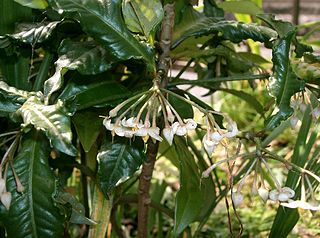
Ardisia is a genus of flowering plants in the family Primulaceae. It was in the former Myrsinaceae family now recognised as the myrsine sub-family Myrsinoideae. They are distributed in the Americas, Asia, Australia, and the Pacific Islands, mainly in the tropics. There are over 700 accepted species. One species, Ardisia japonica is one of the 50 fundamental herbs in traditional Chinese medicine.

Triodia is a large genus of hummock grass endemic to Australia. The species of this genus are known by the common name spinifex, although they are not a part of the coastal genus Spinifex. Many soft-leaved Triodia species were formerly included in the genus Plectrachne. Triodia is known as tjanpi (grass) in central Australia, and have several traditional uses amongst the Aboriginal Australian peoples of the region.

Gastrolobium is a genus of flowering plants in the family Fabaceae. There are over 100 species in this genus, and all but two are native to the south west region of Western Australia.
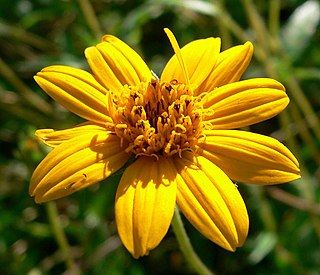
Wedelia is a genus of flowering plants in the family Asteraceae. They are one of the genera commonly called "creeping-oxeyes".

Anisophyllea is a genus of plant in the family Anisophylleaceae. The generic name is from the Greek meaning "unequal leaf", referring to the dimorphism of the leaves.

Euplassa is a genus of flowering plants in the protea family. It is native to tropical South America, including Bolivia, Brazil, Colombia, Ecuador, French Guiana, Guyana, Peru, Suriname, and Venezuela.
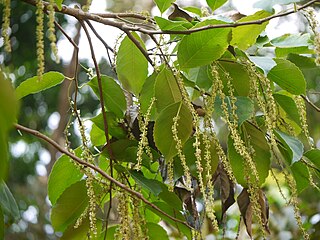
Homalium is a genus of plants in the family Salicaceae.

Streblus is a genus of flowering plants in the mulberry family, Moraceae. It includes five species native to the Indian subcontinent, Indochina, southern China, and Malesia.
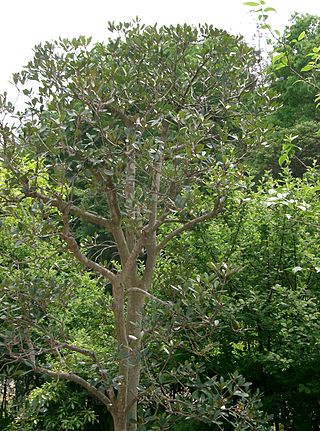
The Pentaphylacaceae are a small family of plants within the order Ericales. In the APG III system of 2009, it includes the former family Ternstroemiaceae.

George Henry Kendrick Thwaites was an English botanist and entomologist.
Timothy Ritchie is an American athlete who competes in distance running events. Tim Ritchie placed 1st in 2:11:56 at the 2017 California International Marathon. Ritchie is also an NCAA Division I coach.
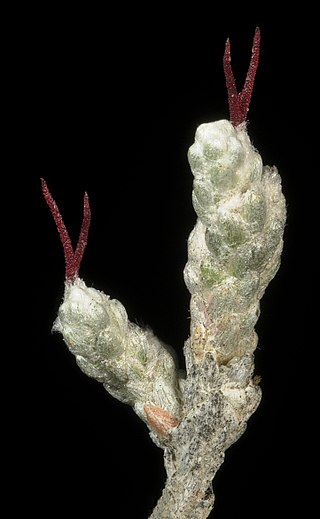
Roycea is a genus of plants formerly in the family Chenopodiaceae, and now in the Amaranthaceae. The genus was first described in 1948 by Charles Austin Gardner, and the genus name honours Robert Dunlop Royce. The entire genus is endemic to Western Australia. There are no synonyms.
Championia is a genus of flowering plants belonging to the family Gesneriaceae. It contains a single species, Championia reticulata, a subshrub native to the humid lowland and montane rain forests of southwestern and central Sri Lanka.

Zanthoxyloideae is a subfamily of the family Rutaceae.

















